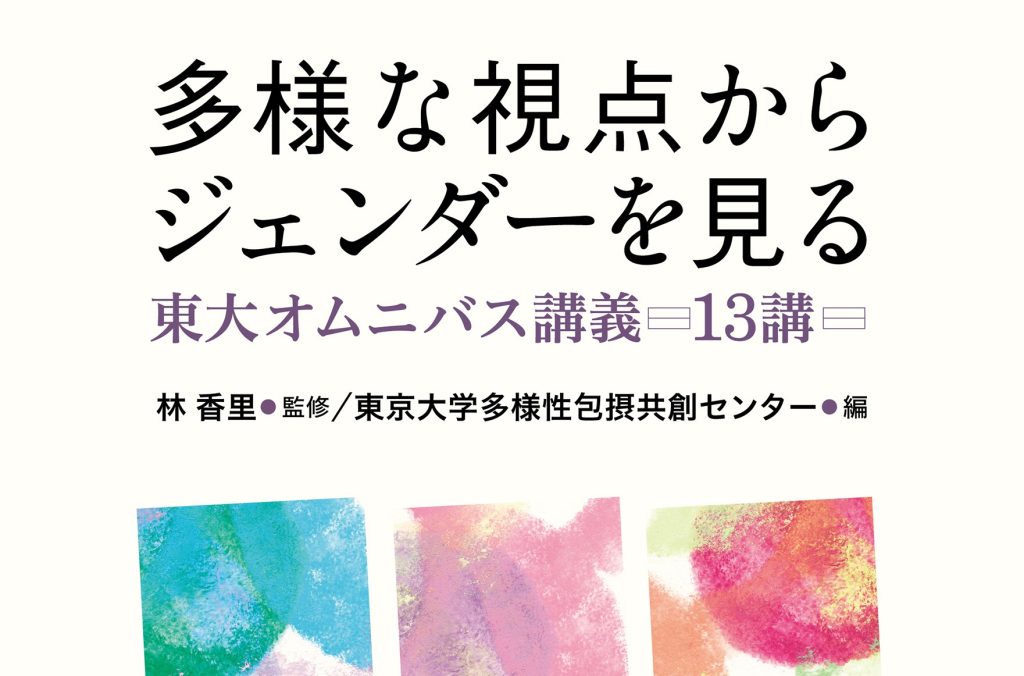The School of Engineering issued a “Declaration of Action on Work Style Reform” in March 2023. We spoke with Professor Yukitoshi MOTOME, who was a member of Committee for the Gender Equality in the School of Engineering at the time, about the background for the declaration and other details.
-We heard that School of Engineering conducted a large-scale survey before announcing the “Declaration of Action for Work Style Reform”.
I, myself joined the Gender Equality Committee of the School of Engineering when I served as a Special Assistant to the Dean of the Graduate School of Engineering in FY2021 and FY2022. At the time, the chair of the committee was Prof. Kyoko Ishizaka, and just after I joined the committee, we decided to conduct a survey on work-life balance.
This survey was targeted at all faculty members including the project appointed faculties. There are various work-life balance-related support provided by the School of Engineering as well as the university as a whole. The purpose of the survey was to gather basic information such as how much was known about these support and the status of parental leave being taken. When we conducted the survey, we received about 200 responses, far more than we had expected.
What surprised us was the additional comments. We received a large number of opinions and requests about improvement of operations, reforming of mindsets, level of anxiety and stress in the field and so on, that were close to screams. This made us realize that we need to make efforts, not only about the work-life balance, but also from broader viewpoints.
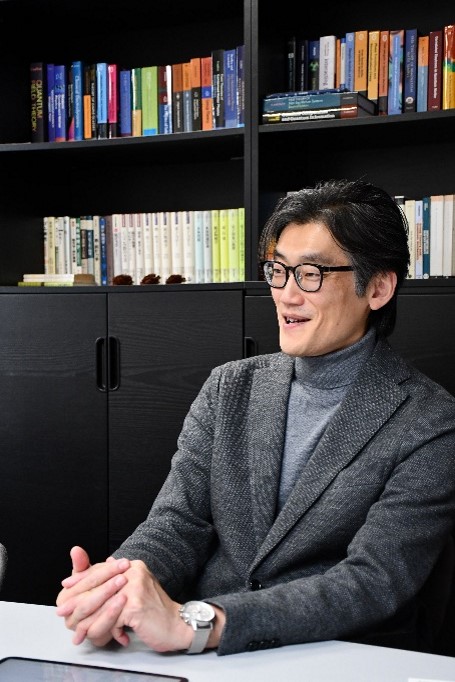
So, we discussed how to proceed with this project with Prof. Ishizaka and Prof. Akiko Kumada taking the lead and the younger faculty members joining them. It was agreed that the most important thing was “to enable all members to maximize their abilities in an environment that is comfortable to work and learn in”. That is why we decided to reform the work styles.
In September 2021, we conducted a wide-ranging opinion survey titled ” Concerning Work Style Reform”. In the survey, we presented a rough draft of future initiatives following the results of the above questionnaire and asked each department to organize their current situation and to abstract problems and best practices. Through such action, we again received a vast number of opinions and requests.
Based on the surveys, we compiled the “Action Plan for Work Style Reform” and presented it at the meeting of the dean and department heads in November. Based on the Action Plan, we held another meeting in December to inquire opinions of not only the faculty members but also the administrative organization. Then, in April 2022, we issued an upgraded Action Plan to all members.
The “Action Plan for Work Style Reform” consists of three components: optimization and efficiency of work, support of young employees and members’ life events, and promoting D & I (diversity and inclusion). However, it is necessary to address them comprehensively because some of these overlaps.
At the same time that the Action Plan was issued, we also proceeded to formulate guidelines regarding meeting hours and a proposal regarding the target age range for hiring employees who have taken maternity or parental leave, etc., as items that could be addressed immediately. Subsequently, seminars on work style reform and projects to promote work style reform were implemented, and in March 2023, a declaration of action was issued.
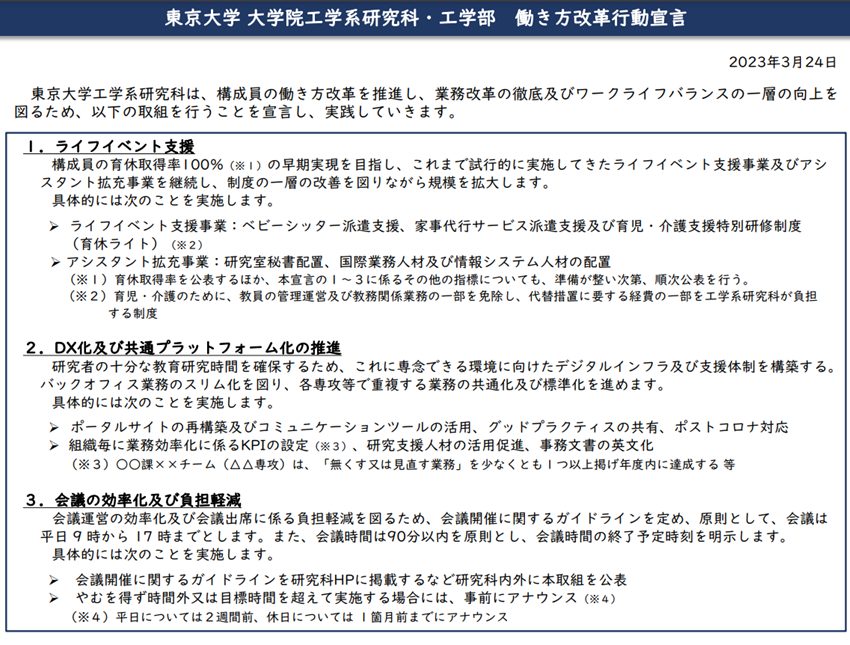
– How did you compile the opinions received?
The School of Engineering has 18 departments, in addition, a large number of research organizations and administrative bodies. Although it is difficult to capture all of the opinions and requests from these departments and organizations, we have tried to identify issues that are common to as many members as possible and to determine the direction in which the school as a whole should advance. As a result of the questionnaires and inquiries, we found that there are problems common to many organizations and that they can be solved by developing what other organizations are doing.
– How is the response to the actual Action Plan and Declaration of Action?
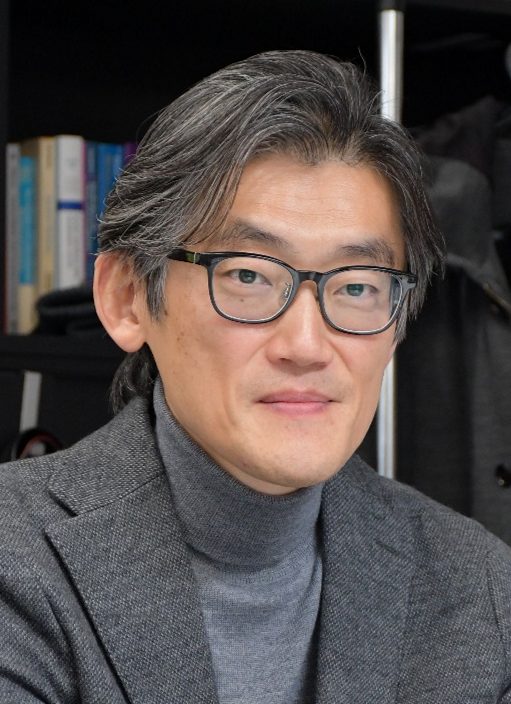
Many people responded that they would like us to actively pursue these initiatives. They have various individual problems individually, but without an official framework, it is difficult for the grassroots to speak up. For example, someone said that it has been difficult to say that they could not pick up their children if meetings were held at such late hours, but now that the guidelines for meeting hours have been established, it has become easier to speak up. In addition, we received opinions that they would like to see the program expanded further in the future and positive reactions to the work style reform promotion program.
It took a lot of effort, but when we get these positive responses, we think that it was all worthwhile. It was also worth the effort in that it highlighted the fact that there are many latent requests. I think there were many things that we would not have known if we had not conducted the survey.
-What are your efforts to increase the number of female faculty members?
Even in the past, the number of women in the sciences, and also in engineering, have been low. There are even fewer female faculty members than female students, highlighting what is known as the “leaky pipeline problem”. This problem is not something that can be solved today or tomorrow because it is deep-rooted. We need to be persistent in our efforts to address this problem by successfully combining measures from the medium- to long-term perspectives with those from the short-term ones.
In the short term, we believe it is important to communicate that in engineering they have opportunities for women and various support measures, including scholarships that are designed with diversity in mind. We would also like to tell them that companies have high expectations for personnel who have PhDs in the engineering field, especially female personnel.
We have also held “Tech Girl Meetup” during our Open Campuses as an initiative for female students. It was good that we were able to appeal to a wider audience including female students in rural areas by promoting the event online following the coronavirus pandemic. It is necessary to continue and expand such efforts in the future.
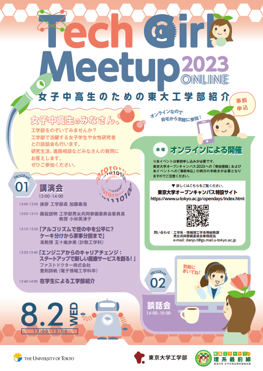
In the medium- to long-term, we need to go further and reach out to elementary and junior high school students. We recognize that we need to change the awareness not only of the students themselves, but also of their parents and teachers. The School of Engineering is continuing with its efforts and the Dean of the Graduate School himself visits junior high schools and high schools. Furthermore, the Metaverse School of Engineering, which was launched last year, has attracted a wide range of participants, including elementary and junior high school students, and I believe it will play a significant role in these efforts.
-Please tell us about your prospects.
The issuance of the Declaration of Action for Work Style Reform is not a goal but a start. It is important to continue to listen to the voices of our members and to promote the Action plan multi-directionally, including further brushing up of the Action Plan, expansion of projects to promote work style reform, and promotion of D&I. We must continue our meticulous efforts to ensure that what is needed is delivered where it is needed.
Interviewed on 12 January 2024 on Hongo Campus
Interviewer: Mariko Ogawa
Text and photographs by Madoka Nakano
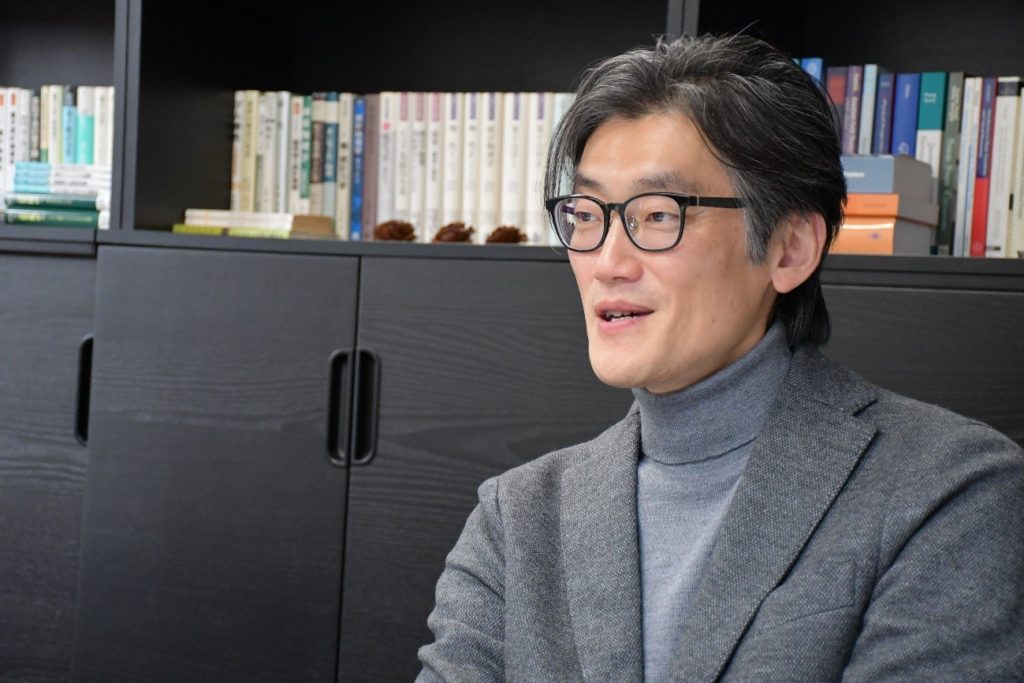
-1024x683.jpg)

